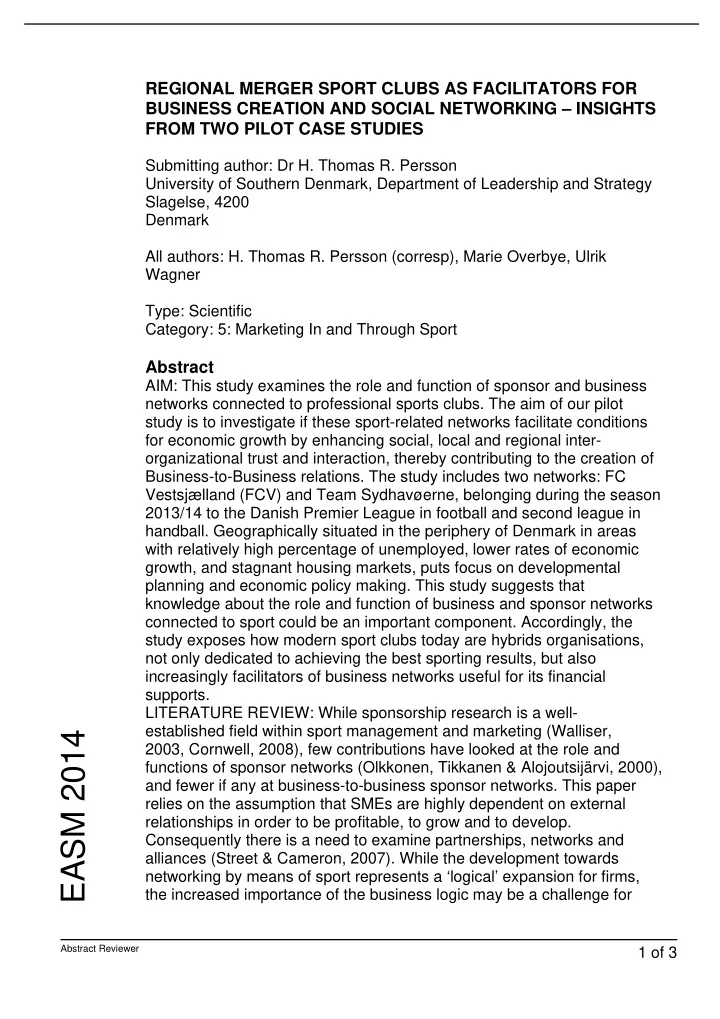

REGIONAL MERGER SPORT CLUBS AS FACILITATORS FOR BUSINESS CREATION AND SOCIAL NETWORKING – INSIGHTS FROM TWO PILOT CASE STUDIES Submitting author: Dr H. Thomas R. Persson University of Southern Denmark, Department of Leadership and Strategy Slagelse, 4200 Denmark All authors: H. Thomas R. Persson (corresp), Marie Overbye, Ulrik Wagner Type: Scientific Category: 5: Marketing In and Through Sport Abstract AIM: This study examines the role and function of sponsor and business networks connected to professional sports clubs. The aim of our pilot study is to investigate if these sport-related networks facilitate conditions for economic growth by enhancing social, local and regional inter- organizational trust and interaction, thereby contributing to the creation of Business-to-Business relations. The study includes two networks: FC Vestsjælland (FCV) and Team Sydhavøerne, belonging during the season 2013/14 to the Danish Premier League in football and second league in handball. Geographically situated in the periphery of Denmark in areas with relatively high percentage of unemployed, lower rates of economic growth, and stagnant housing markets, puts focus on developmental planning and economic policy making. This study suggests that knowledge about the role and function of business and sponsor networks connected to sport could be an important component. Accordingly, the study exposes how modern sport clubs today are hybrids organisations, not only dedicated to achieving the best sporting results, but also increasingly facilitators of business networks useful for its financial supports. � LITERATURE REVIEW: While sponsorship research is a well- established field within sport management and marketing (Walliser, EASM 2014 2003, Cornwell, 2008), few contributions have looked at the role and functions of sponsor networks (Olkkonen, Tikkanen & Alojoutsijärvi, 2000), and fewer if any at business-to-business sponsor networks. This paper relies on the assumption that SMEs are highly dependent on external relationships in order to be profitable, to grow and to develop. Consequently there is a need to examine partnerships, networks and alliances (Street & Cameron, 2007). While the development towards networking by means of sport represents a ‘logical’ expansion for firms, the increased importance of the business logic may be a challenge for Abstract Reviewer 1 of 3
clubs coined by sporting and civil society tradition dominated by the logics of winning and voluntarism. Therefore, the paper embraces the emergence of multiple institutional logics in organisational settings (Friedland & Ahlford, 1991).� RESEARCH DESIGN: The study is defined as a pilot study as it explores a hitherto little researched area within sport marketing/sponsorship, sport and SMEs, and sport for development. Insights gained through this study will form the basis for a larger research project at a later stage. A web- based survey was distributed among the members of the two sponsor and business networks during the autumn and winter 2013 (FCV: N=59, response rate. 42%; TSØ: N=49, response rate. 35%). The survey targeted five themes: firm background, network involvement, perceptions of the network, organizational changes due to network involvement, and future commitment. Six semi-structured interviews with SME representatives were conducted during January to April 2014. In addition, informal meetings with club representatives were held both prior to and after completing the survey to transfer knowledge from research to practitioners. � RESULTS, DISCUSSION, IMPLICATIONS: The preliminary results suggest that using the network to make Business-to-Business arrangements is of utmost importance for the sponsors. Respectively, 57% and 75% of the TSØ and FCV sponsors regarded it as of great importance. Amongst the TSØ sponsors, this was toped by supporting elite handball (60%), while only few companies (6% TSØ; NN% FCV) did not regard networking a reason for sponsorship. The two most common reasons for taking part in network meeting was the opportunity to meet and interact with other businesses (56% TSØ; 73% FCV) and create opportunities for new businesses (53% TSØ; 66% FCV). More than half of the network members (56% TSØ; 61% FCV) agreed that they would prefer doing business with network members over non-members; a smaller number (18% TSØ; 10% FCV) would prefer this, even if the price would be higher. Also, there are several firms that have increased its business with network members, after having joined the networks. The same is true once asked about number of private relations with network members. From the pilot study there seems to be indications supporting the assumption that sport club related business networks might play a vital role for business creation. Main limitation of this study is the relatively low number of respondents. Thus, to expose the real impact of such EASM 2014 networks and whether they ought to be regarded an element of policy making aiming at generating economic growth, the next step should be to enlarge the number of firms investigated by including all networks associated with top foot- or handball clubs in Denmark. References Cornwell, T. B. (2008). State of the art science in sponsorship-linked marketing. Journal of Advertising, 8, (3). 41-55.� Friedland, R. & Alford, R. (1991). Bringing Society Back In: Symbols, Abstract Reviewer 2 of 3
Practices, and Institutional Contradictions. In: Powell. W. & DiMaggio, P. (Eds.) The New Institutionalism in Organizational Analysis. (pp. 232- 263). Chicago University Press. � Olkkonen,R.; Tikkanen, H. & Alojoutsijärvi, K. (2000). Sponsorships as relationships and networks: Implications for research. Corporate Communication: An International Journal, 5. 12-18. � Street, C. T. & Cameron, A. (2007). External relationships and the small business: A review of small business alliance and network research. Journal of Small Business Management, 45. 239-266. � Walliser, B. (2003). An international review of sponsorship research: extension and update. International Journal of Advertising, 22. 5-40. EASM 2014 Abstract Reviewer 3 of 3
Recommend
More recommend